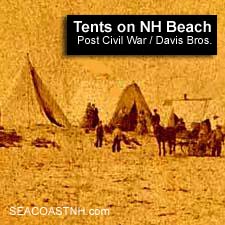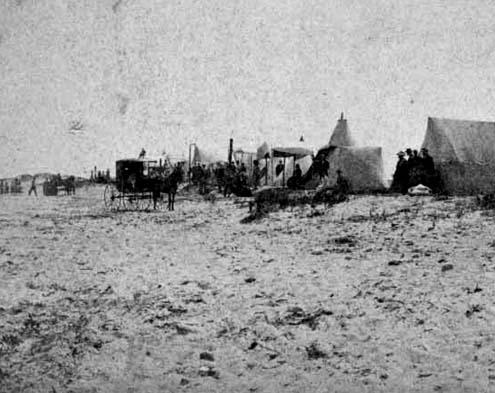|
FRESH STUFF DAILY |
|
|
||
|
|
||
|
|
||
|
SEE ALL SIGNED BOOKS by J. Dennis Robinson click here |
||
Page 1 of 2
Three men in a tent on the seacoast. Here is another of Whittier’s many poems about our coastal region. The words may be tough to follow, at first, but give it time. Read carefully – and aloud – and discover the universal message. We’ve paired this poem with some remarkable David Bros. Images from the same era, soon after the Civil War, when people needed a few days and nights of surf, and sand and contemplation.
JUMP right to the poem Whittier at Hampton Beach Whittier has been blamed for drawing too many tourists to Hampton Beach following the publication of this poem in 1867. Recently famous in 1866 for his blockbuster poem "Snow-Bound" John Greenleaf Whittier was attracting more readers – readers who followed his suggestion to bring their tents to the NH seacoast. But Whittier certainly was not to blame for the rush of new middle class tourists who thronged Victorian Portsmouth and its nearby beaches. Trains and then trolleys, expanding factories, more leisure time among the rising middle class and the release of pressure after the Civil War all contributed. Whittier shares his tent with two other writers, poet and travel writer Bayard Taylor, and his editor James T. Fields. Originally from Portsmouth, NH, Fields became the best known Boston publisher of great writers, American and English, from Charles Dickens to Nathaniel Hawthorne and Henry Wadsworth Longfellow. It was Fields who urged Whittier to get out another book quickly after his success, and Whittier notes in this very poem that Fields could "well the market value tell/ Of poet and philosopher". Fields was right. The book sold rapidly, even though the slim volume contained only recycled work from Whittier and – besides this poem -- nothing new. Whittier felt he had ripped-off the public, but he took the money. He wrote to Fields after its publication saying, "The swindle is awful. Barnum is a saint to us. I am bowed with a sense of guilt, ashamed to look an honest man in the face." Although tough to penetrate today with its classical references, the poem offers strong images of the sights and sounds of the seacoast in the second half of the 19th century. Judging from these tourist photographs by the David Bros. Studios of Portsmouth, the tents of the era were large and rough hewn. The images of a horse drawn cart and people crowded together for overnight camping on the ocean are a perfect match to Whittier’s poem. Careful readers will even notice a reference to Celia Thaxter’s poem "The Spanish Sailors" here where Whittier mentions the ghosts of Haley’s Island. Whittier often visited Celia on Appledore Island and loved to hear her tell stories about the Isles of Shoals. Ultimately the poem is about finding peace in contemplation of the timeless sea, a popular theme of local writers. Whittier’s two companions were used as a narrative element to weave together the other poems in the Volume of the same name "The Tent on the Beach". The book also included "The Changleing" and "The Wreck of Rivermouth". – J. Dennis Robinson SOURCE NOTE: In his 1985 biography of Whittier – used as a source for the info above -- author Roland H. Woodwell notes that this poem is about Salisbury Beach in Massachusetts. That is hard to believe considering Whittier’s own opening paragraph. See John Greenleaf Whittier: A Biography, Chapter XXIV, pages 343-356.
Continue with THE TENT ON THE BEACH Please visit these SeacoastNH.com ad partners.
News about Portsmouth from Fosters.com |
| Friday, April 26, 2024 |


|
Copyright ® 1996-2020 SeacoastNH.com. All rights reserved. Privacy Statement
Site maintained by ad-cetera graphics





 SEACOAST POEMS
SEACOAST POEMS















